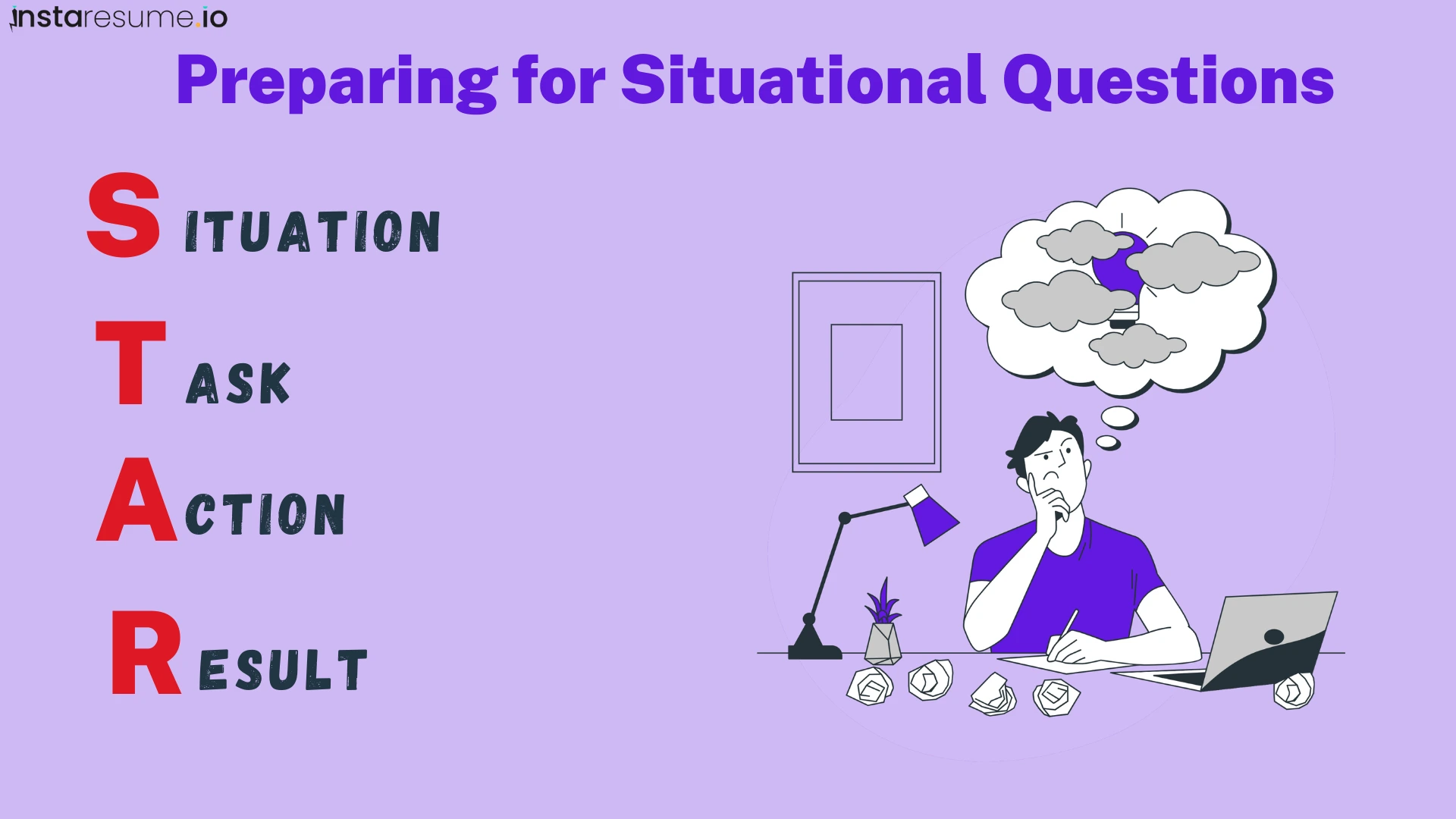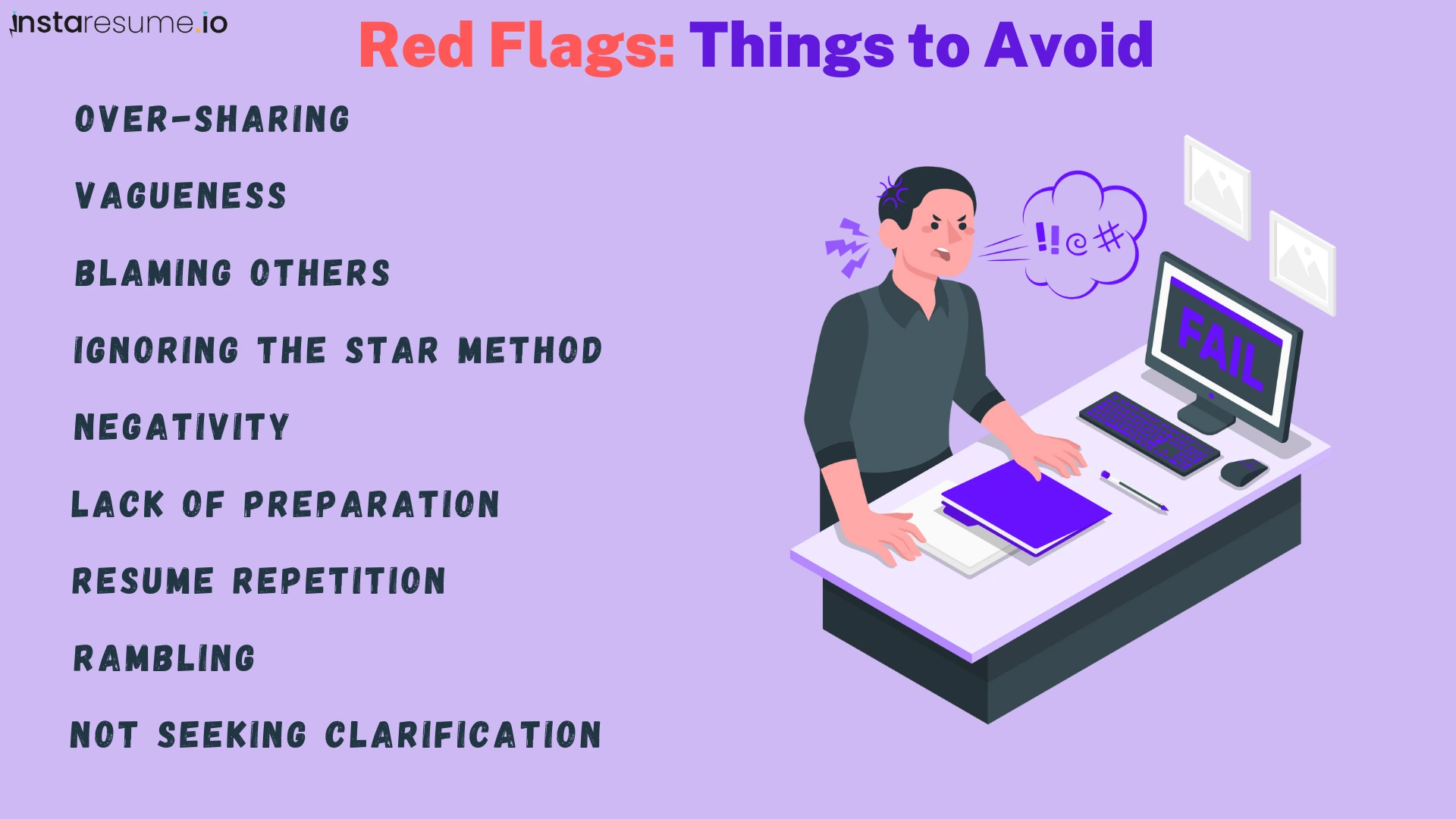Situational Interview Questions

Situational Interview Questions
Starting a job search is exciting, but it comes with challenges. Alongside updating your resume and LinkedIn profile, you need to prepare for situational interview questions. These questions are increasingly popular with employers and focus on your ability to handle real-life work situations. To succeed, you must understand and prepare for them. In this blog post, we will show you how to get ready for STAR situation interview questions where STAR stands for (Situation, Task, Action, Result).
We'll help you structure your answers, deal with unexpected questions, and shine even if you lack direct experience. We'll also explain how to highlight your problem-solving skills and resourcefulness in handling common situations mentioned in job interviews. You'll learn how to align your answers with the keywords in the job posting and demonstrate your teamwork and leadership skills. From managing difficult coworkers to handling challenging deadlines, we'll guide you on handling various situations effectively while managing stress and time. By the end of this blog post, you'll be well-prepared to answer difficult situation interview questions very fluently.
Preparing for Difficult Situational Interview Questions
Preparing for situational interview questions is a vital step to interview success. These questions aim to assess your ability to handle real-life workplace scenarios. To get ready, consider using the STAR method:

Guide to Acing Situational Interview Questions
Situation: Understand the context of the scenario. What was the challenge, and where did it take place?
Task: Identify your role and what needed to be accomplished in that situation.
Action: Describe what you did to address the situation or solve the problem. Emphasize your skills, teamwork, and leadership abilities.
Result: Highlight the outcome of your actions and how they positively impacted the situation.
In addition to the STAR method, it's crucial to anticipate and rehearse answers to common situational interview questions. For instance, questions related to handling challenging deadlines, showcasing time management skills, and managing stress might come up.
Remember, you can draw on your experiences to create responses that align with your career development plan. And while handling unexpected questions can be nerve-wracking, practicing your answers and using the STAR method can help you respond confidently.
For a better understanding, let's provide a few example answers to common situational questions in the subsequent sections. Preparing for these questions will significantly boost your chances of impressing interviewers and landing your dream job.
Sample Situational Interview Questions
To help you prepare for situational interviews, here are some common situational interview questions and suggested answers using the STAR method:
1. Can you tell me about a time you had to work with a difficult coworker?
Situation: At my previous job, I worked with a coworker who often had conflicting ideas.
Task: My role was to collaborate with her on a project.
Action: I maintained a calm and professional attitude, looking beyond our differences to focus on her valuable input.
Result: Our project became a success, demonstrating my teamwork and problem-solving abilities.
2. Describe a time when you had to deal with a difficult customer.
Situation: While working in customer service, I encountered an unhappy customer.
Task: My goal was to resolve the issue and retain their satisfaction.
Action: I actively listened to their concerns, empathized, and provided a solution that diffused the situation.
Result: The customer left satisfied, showcasing my resourcefulness and customer handling skills.
3. Share an experience when you had to take on a leadership role without prior training.
Situation: In my previous job, I had to lead a team temporarily when our leader left.
Task: My task was to motivate the team and ensure project completion.
Action: I effectively communicated, delegated tasks, and resolved conflicts.
Result: We completed projects on time, highlighting my leadership and problem-solving abilities.
4. Have you faced a difficult decision with limited information? What did you do?
Situation: I had to decide between a higher-paying job and my current role with more growth potential.
Task: To make the right choice for my career development.
Action: I assessed my long-term goals and used available resources to make an informed decision.
Result: I made a choice aligning with my career development plan and goals, showcasing my resourcefulness.
5. Tell me about a time you had to manage stress to meet a challenging deadline.
Situation: During my final year at university, I faced high stress while working on my thesis.
Task: To complete the project on time and meet all requirements.
Action: I organized my schedule, managed stress through exercise and breaks, and focused on time management.
Result: I completed the thesis on time, demonstrating my time management and stress management skills.
These sample situational interview questions demonstrate the importance of using the STAR method and aligning your responses with the specific keywords and skills mentioned in the job posting. Preparing answers to these questions will make you more confident and effective during your interviews, ultimately advancing your career development plan.
Red Flags: Common Mistakes to Avoid

Red flags: Mistakes to avoid
While preparing for situational interview questions is crucial, it's equally vital to be aware of and steer clear of common pitfalls that can hinder your success. Here are some mistakes to avoid:
Over-Sharing
Avoid sharing excessive personal details or straying off-topic. Stick to the situation at hand and the skills you used to address it.
Vagueness
Providing unclear responses can leave interviewers uncertain about your abilities. Ensure your answers are concise, using the STAR method for effective structure.
Blaming Others
Refrain from blaming colleagues or external circumstances. Focus on your actions in addressing the situation positively.
Ignoring the STAR Method
This framework is vital for well-structured answers. Neglecting it can lead to disorganized responses.
Negativity
Stay positive, even when discussing challenges or mistakes. Emphasize what you've learned and the positive outcomes.
Lack of Preparation
Inadequate preparation is a common mistake. Anticipate situational questions to avoid stumbling during the interview.
Resume Repetition
Avoid reiterating your resume. Use situational questions to showcase your skills and competencies in action.
Rambling
Lengthy answers can lose the interviewer's attention. Keep your responses focused and concise.
Not Seeking Clarification
If a question is unclear, ask for clarification to provide accurate and relevant answers.
Neglecting Soft Skills
Highlight both hard and soft skills, including communication, adaptability, and problem-solving.
By sidestepping these common mistakes, you'll be better prepared to handle situational interview questions professionally and effectively. Your aim is to leave a positive, memorable impression, demonstrating your competence in tackling real-world challenges.
Conclusion
In the world of job interviews, mastering situational interview questions can set you apart as a candidate who's not just qualified but capable of excelling in real-world scenarios. By understanding the STAR method and practicing your responses, you gain the confidence and structure needed to impress interviewers.
Remember to align your answers with the keywords in the job posting, showcasing your ability to fulfill the role's requirements. Whether you're dealing with difficult coworkers, challenging deadlines, or difficult customers, it's your opportunity to shine.
Steer clear of common mistakes such as over-sharing or being vague, and always stay positive. Preparation is key. By rehearsing and anticipating common situational questions, you'll be better equipped for the interview, leaving a lasting impression.
Situational interview questions are not just a test of your past experiences but a projection of your potential. Your ability to apply your skills to real-world situations can be the defining factor in your job search success. So, embrace the challenge, and let your competence and problem-solving abilities shine. Your dream job is within reach.

